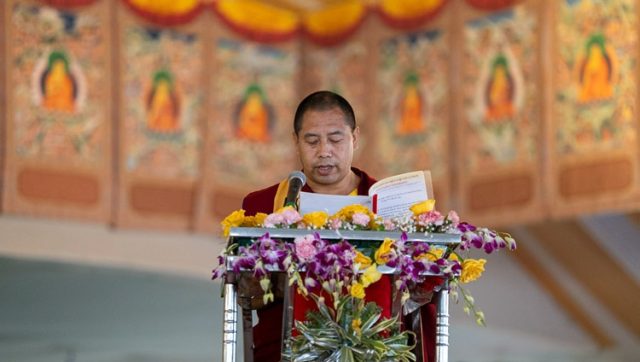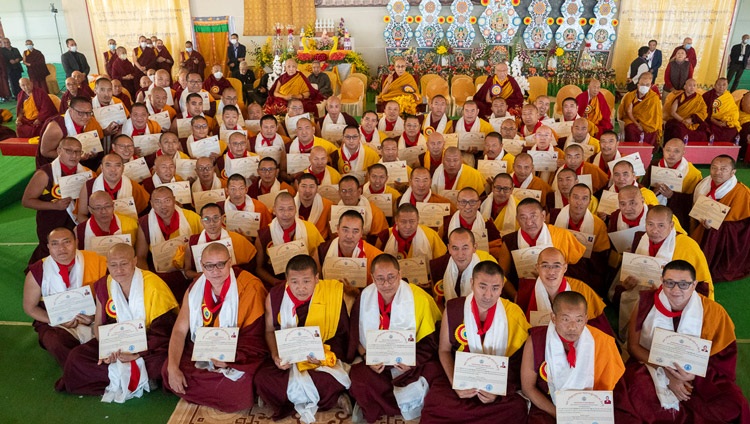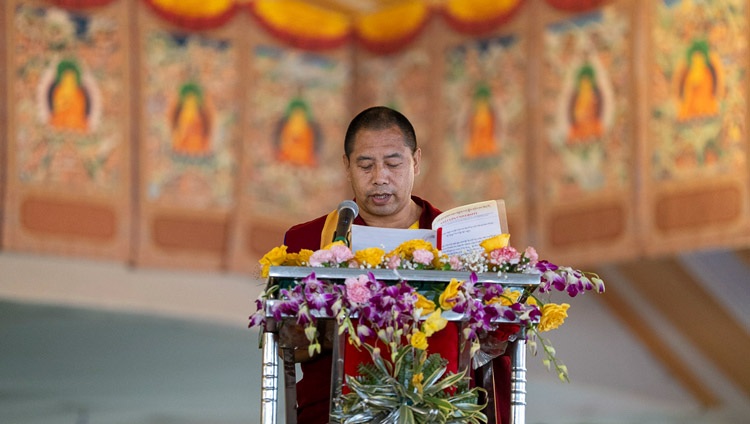
Geshé Tulku Tenzin Sherab delivering his opening remarks at the Gelukpa University Convocation and the Award of Geshé Lharampa Degrees at the Kalachakra Ground in Bodhgaya, Bihar, India on January 3, 2024. Photo by Tenzin Choejor
By — BT NEWSDESK
Bodhgaya, Bihar, India, 3 January 2024: This morning, His Holiness the Dalai Lama was invited to preside over the Gelukpa University Convocation and the award of Geshé Lharampa degrees to Geshés who had graduated over the last four years. He was met at the gate to the Kalachakra Ground by abbots of the great monastic seats of learning in south India—Ganden, Drepung and Sera—who escorted him to the stage. His Holiness sat in the middle with Ganden Tri Rinpoché to his right and Jangtsé Chöjé Rinpoché to his left.
Proceedings opened with a verse of homage to the Buddha:
I pay homage to the Chief of Shakya clan,
Who took birth in the Shakya lineage out of compassion and skilful means,
Who was invincible and defeated the forces of evil beings
And whose body was like a majestic golden mountain.
Moderator for the occasion, Geshé Tulku Tenzin Sherab, welcomed His Holiness, as well as other guests and dignitaries, to the stage. He explained that after the onslaught in 1959 that destroyed much of the Buddhist tradition in Tibet, many Tibetans we able to reach India due to the blessings of His Holiness. Monastics congregated in a camp in Buxaduar, where, under the guidance of His Holiness and his two tutors, a Geshé Lharam examination board was set up. Meanwhile, monks belonging to the three great Monastic Universities kept their traditions of study alive. The moderator declared that the kindness of His Holiness in leading and inspiring all this cannot be repaid.
In 1970, a Gelukpa Examination Board was established, comprising abbots and examination officers, who laid out procedures and rules. Since then, more than 1000 Geshés have graduated. Many of them are serving the Dharma in different parts of the world.
Ganden Tri Rinpoché was invited to speak: “The custodian of the Buddhadharma, His Holiness the Dalai Lama, is with us here today, as we gather to celebrate the Gelukpa University Convocation and the ceremony for awarding degrees. Those graduating today have studied thoroughly, exercised logic and debate and appeared for their exams. As a result, they will receive their Lharampa degrees. As Jé Rinpoché has advised, we must study, reflect and integrate what we’ve learned within.
“Once you have earned your Geshé degree, it’s customary to enter either Gyudmé or Gyudtö Tantric College to study the four interwoven commentaries of Guhyasamaja. This is a tradition that has been passed down without a break from the time of Jé Rinpoché. There are other texts to be memorized by newly graduated Geshés, but what is particularly important is to be able to pass on the reading transmission of the Guhyasamaja commentary. I urge you all to put effort into this. As Serkhong Tsenshab Rinpoché used to say, it is essential to keep this tradition alive.
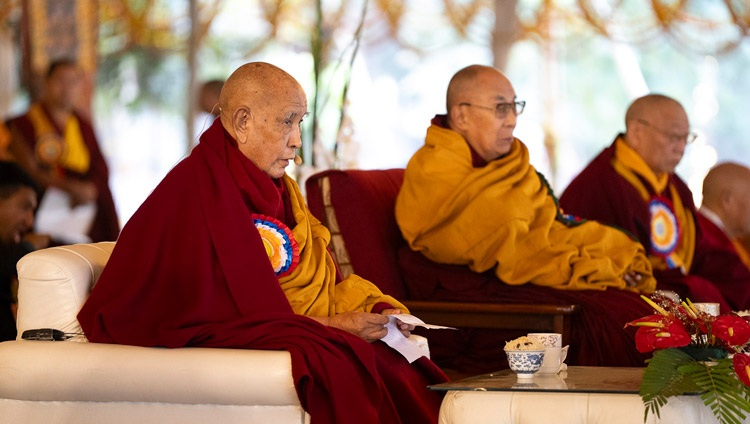
Ganden Tri Rinpoché speaking at the Gelukpa University Convocation and the Award of Geshé Lharampa Degrees at the Kalachakra Ground in Bodhgaya, Bihar, India on January 3, 2024. Photo by Tenzin Choejor
“I pray that His Holiness the Dalai Lama and leaders of all our other Buddhist traditions may live long.”
“Today sees the conclusion of the Mönlam Chenmo or Great Prayer Festival,” His Holiness announced. “All of us gathered here are followers of the Buddha. We should recognise that the teaching of the Buddha is not about saying prayers and performing rituals. It’s mainly about using our minds to cultivate the awakening mind of bodhichitta and insight into emptiness.
“As a Buddhist monk, I generate the awakening mind and an understanding of emptiness the moment I wake in the morning, so my day is imbued with these principles. Generating bodhichitta enables me to fulfil the aims of myself and others and I call all sentient beings as my guests at the feast of enlightenment.
“I also do my best to combine bodhichitta with the view of emptiness, which is the way to overcome mental afflictions and disturbing conceptions. However powerful mental afflictions and disturbing conceptions may be, they are rooted in ignorance and so are without any sound foundation. Bodhichitta and emptiness, on the other hand, are more powerful and are supported by logic and reason.
“Jé Tsongkhapa advised:
In the beginning, I sought much learning.
In the middle, all teachings dawned on me as spiritual instructions.
In the end, I practised day and night.
I dedicated all this virtue for the dharma to flourish.
“Therefore, the more we learn, the more we gain insight and experience. The Buddhadharma is logical and rational. As is mentioned in ‘Entering into the Bodhisattva Way’, there’s nothing that does not become easier with familiarity. The more familiar we become with emptiness, the more our ignorance is reduced.
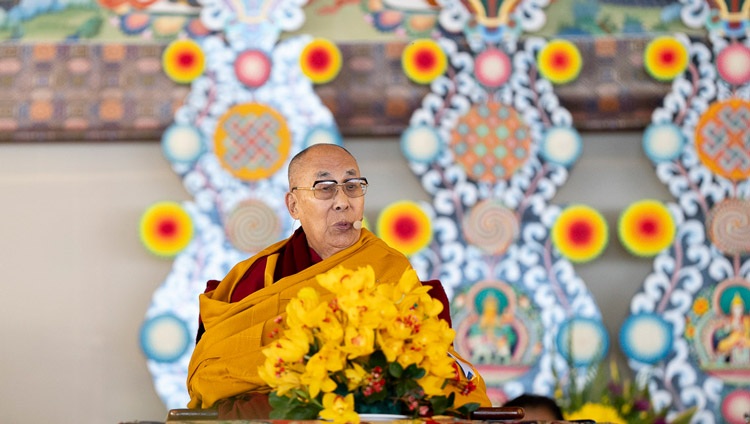
His Holiness the Dalai Lama addressing the congregation at Gelukpa University Convocation and the Award of Geshé Lharampa Degrees at the Kalachakra Ground in Bodhgaya, Bihar, India on January 3, 2024. Photo by Tenzin Choejor
“I work to integrate bodhichitta and emptiness with my mind every day, and I see the impact it has. Deity yoga is important, but being able to cultivate the awakening mind of bodhichitta and an understanding of emptiness are even more so. I urge you to really pursue these practices, confident that they will make you feel at ease. Bodhichitta and emptiness are what make life meaningful. Engaging in deity yoga in the absence of bodhichitta and emptiness will be ineffective.
“On this day when you are receiving your Lharampa degrees, we can recognise that studying the Buddhadharma is something incredible. It’s something particular to Tibet. I have friends from many other Buddhist countries, but few of them study as we do. My own studies began when I was a small child. As I told you the other day, when I was about three years old, I visited Kumbum Monastery and was struck by the sight and sound of young monks prostrating as they recited Om ara patsa na dhih. I was moved to imitate them. In due course, I came to Central Tibet to begin my formal studies. These included Collective Topics, Mind and Awareness, and the study of logic and reason. What effectively consolidated these studies was the practice of debate.
“We may be concerned about the current situation in the world. We may be anxious about the environmental challenges we face, but Manjushri will strengthen our intelligence to be able to resolve the problems we confront. That’s all I want to say for now.”
The moderator explained that the more than 300 Geshé graduates would file up onto the stage where Ganden Tri Rinpoché would present them with their degree certificates. This they did, white silk scarves being draped around their necks as they reached the stage. Having received their degree certificates, each of the Geshé bowed before His Holiness prior to leaving the stage.
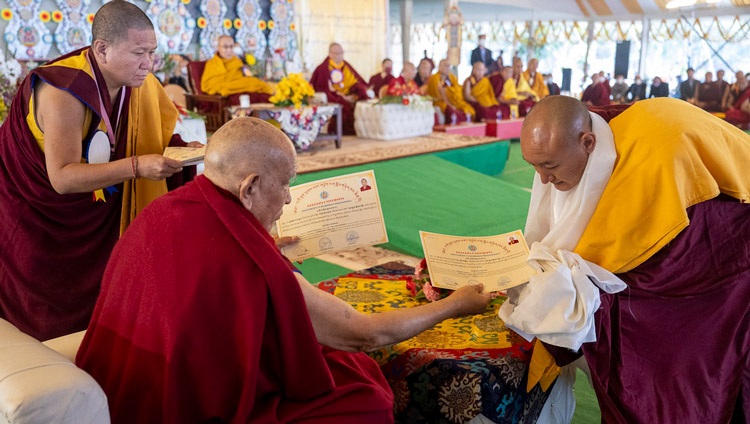
Ganden Tri Rinpoché presenting degrees to the Geshe graduates during the Gelukpa University Convocation and the Award of Geshé Lharampa Degrees at the Kalachakra Ground in Bodhgaya, Bihar, India on January 3, 2024. Photo by Ven Zamling Norbu
Groups of Geshés who graduated in each of the last four years gathered around His Holiness to have photographs taken with him.
His Holiness expressed a wish to speak to the gathering once more.
“Jé Rinpoché told us that whatever we hear or read about, we need to apply the fourfold reasoning to really understand it. We might ask in relation to something—’Is it a particle? Or is it not a particle? Is it both a particle and not a particle? Or is it neither a particle nor not a particle?’
“Having gained some understanding we explore and test it in debate. This is how we gain conviction in the teaching. Then we extend our understanding by reflecting day and night on the meaning of whatever we’ve studied. This approach belongs especially to the Nalanda Tradition. Shantarakshita and other Indo-Tibetan scholars reflected on what they had learned and integrated it within themselves. It’s important that we do this too. The point is to study, reflect and practise.
“We must look for the reasons behind the teaching. We can’t rely merely on the words of the classic treatises we must transform what they mean into a living experience.
“Those of you who have received your Geshé degrees today have done well. Now, I urge you to set an example to others by putting what you’ve learned into practice. Through study, reflection and meditation you can integrate what you’ve learned with your minds.
“The day before yesterday a strong earthquake shook Japan. Many people there are now anxious about what’ll happen next. Japan is a Buddhist country where they also recite the ‘Heart Sutra’. Whenever a disaster takes place anywhere in the world we should feel sympathy for the people affected. So, today, let’s recite the ‘Heart Sutra’ together for the people of Japan, especially the victims of the earthquake.”
The entire gathering joined together in chanting the ‘Heart Sutra’ as His Holiness had advised, completing it with a few recitations of the mantra of the Lion-faced Dakini.


